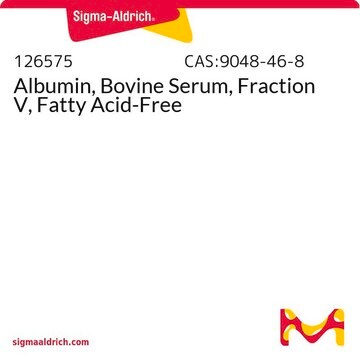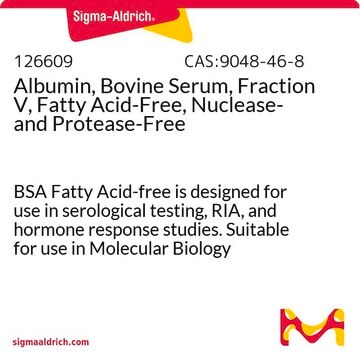12660
Albumin, Bovine Serum, Fraction V, Modified Cohn, pH 5.2
Synonym(s):
Albumin, Bovine Serum, Fraction V, Modified Cohn, pH 5.2
Sign Into View Organizational & Contract Pricing
All Photos(1)
About This Item
Recommended Products
Assay
≥96% (SDS-PAGE)
form
solid
manufacturer/tradename
Calbiochem®
storage condition
OK to freeze
impurities
≤5% Moisture
color
off-white
solubility
0.15 M sodium chloride: 10 mg/mL
cation traces
heavy metals: ≤50 ppm
shipped in
ambient
storage temp.
2-8°C
General description
Albumin, Bovine Serum, Fraction V, Modified Cohn, pH 5.2 is a native fatty acid profile that reflects endogenous lipids. It has a pH in the range of 4.8-5.4 in 150 mM NaCl (1%).
Bovine serum albumin (BSA), a non-glycosylated globular, α-helical protein, belongs to the serum albumin family. It consists of three domains with two sub-domains each and has 17-disulfide bonds.
Application
Albumin, Bovine Serum, Fraction V, Modified Cohn, pH 5.2 has been used as a blocking agent in western blotting. It has also been used as a component in phosphate-buffered saline (PBS) for diluting secondary antibodies and blocking in immunofluorescence to observe the localization of the Golgi apparatus.
Biochem/physiol Actions
Bovine Serum Albumin (BSA) is the most vital component of cell culture media. It aids in the differentiation of embryonic stem cells (hESC). It plays a key role in the transportation of drugs, hormones, and fatty acids. BSA is used in enzyme-linked immunosorbent assay (ELISA) as a blocking agent.
Warning
Toxicity: Standard Handling (A)
Reconstitution
Following reconstitution, aliquot and freeze (-20°C). Stock solutions are stable for up to 6 months at -20°C.
Legal Information
CALBIOCHEM is a registered trademark of Merck KGaA, Darmstadt, Germany
Storage Class Code
11 - Combustible Solids
WGK
WGK 3
Flash Point(F)
Not applicable
Flash Point(C)
Not applicable
Certificates of Analysis (COA)
Search for Certificates of Analysis (COA) by entering the products Lot/Batch Number. Lot and Batch Numbers can be found on a product’s label following the words ‘Lot’ or ‘Batch’.
Already Own This Product?
Find documentation for the products that you have recently purchased in the Document Library.
Customers Also Viewed
Anna Eslami et al.
Journal of visualized experiments : JoVE, (44) (2010-12-30)
Western blotting is an analytical technique used to detect specific proteins in a given sample of tissue homogenate or extract. It uses gel electrophoresis to separate native or denatured proteins by the length of the polypeptide (denaturing conditions) or by
Miyu Tsuchiya et al.
Oncology letters, 11(5), 3279-3286 (2016-04-29)
N-glycosylation is a post-translational protein modification with a wide variety of functions. It has been predicted that R-spondin1 (RSPO1) is N-glycosylated, although this remains unknown. The present study identified that RSPO1 was N-glycosylated at Asn137, and that N-glycosylation of RSPO1
Yuhong Xiao et al.
Journal of immunological methods, 384(1-2), 148-151 (2012-06-27)
The enzyme-linked immunosorbent assay (ELISA) is an extremely common and powerful laboratory technique for detecting proteins by antibodies. Researchers frequently use bovine serum albumin (BSA) as a blocking agent to prevent non-specific binding of antigens and antibodies to the microtiter
S Chodankar et al.
Physical review. E, Statistical, nonlinear, and soft matter physics, 77(3 Pt 1), 031901-031901 (2008-06-04)
Small-angle neutron scattering (SANS) and dynamic light scattering (DLS) have been used to study conformational changes in protein bovine serum albumin (BSA) due to perturbation in its native structure as induced by varying temperature and pressure, and in presence of
Geoffrey L Francis
Cytotechnology, 62(1), 1-16 (2010-04-08)
Albumin has a long historical involvement in design of media for the successful culture of mammalian cells, in both the research and commercial fields. The potential application of albumins, bovine or human serum albumin, for cell culture is a by-product
Our team of scientists has experience in all areas of research including Life Science, Material Science, Chemical Synthesis, Chromatography, Analytical and many others.
Contact Technical Service






